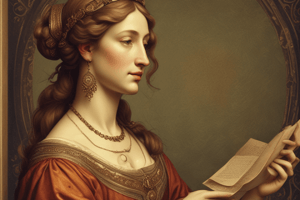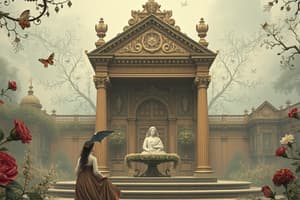Podcast
Questions and Answers
What does Eliot refer to as 'the dissociation of sensibility'?
What does Eliot refer to as 'the dissociation of sensibility'?
- A unified expression of artistic talent
- The inability to feel and think as one (correct)
- A reaction to political upheaval
- A literary style of the Elizabethan era
What marked the division of literary history in England during the 17th century?
What marked the division of literary history in England during the 17th century?
- The outbreak of the Civil War (correct)
- The Protestant Reformation
- The beginning of the Industrial Revolution
- The establishment of the monarchy in 1660
Which literary period in France is characterized by the works of Molière and Racine?
Which literary period in France is characterized by the works of Molière and Racine?
- The age of French classicism (correct)
- The age of Baroque
- The age of Romanticism
- The age of Enlightenment
What major conflict influenced the early literary scene in Germany?
What major conflict influenced the early literary scene in Germany?
What was a key social change in the Netherlands during the early 17th century?
What was a key social change in the Netherlands during the early 17th century?
What cultural phenomenon did the early conflicts of the 17th century lead to in Italy and Germany?
What cultural phenomenon did the early conflicts of the 17th century lead to in Italy and Germany?
What was the primary effect of the civil, political, and religious conflicts on literature during the first half of the century?
What was the primary effect of the civil, political, and religious conflicts on literature during the first half of the century?
Which feature characterizes the writing style of Elizabethan and Jacobean writers compared to later poets?
Which feature characterizes the writing style of Elizabethan and Jacobean writers compared to later poets?
Which playwright is considered England's greatest dramatic and poetic talent of the late 16th to early 17th century?
Which playwright is considered England's greatest dramatic and poetic talent of the late 16th to early 17th century?
What aspect of the Protestant Reformation influenced literature notably in the 16th century?
What aspect of the Protestant Reformation influenced literature notably in the 16th century?
What did the questioning attitude of the 17th century writers primarily challenge?
What did the questioning attitude of the 17th century writers primarily challenge?
Who typified the development of humanism in the 16th century?
Who typified the development of humanism in the 16th century?
What did John Milton reflect in his writings during the 17th century?
What did John Milton reflect in his writings during the 17th century?
Which of the following works was NOT written by an English author during the 17th century?
Which of the following works was NOT written by an English author during the 17th century?
What core question did Michel de Montaigne pose that influenced writers in the 17th century?
What core question did Michel de Montaigne pose that influenced writers in the 17th century?
Which scientist's work advocated a skeptical and rationalist mode of thought during the 17th century?
Which scientist's work advocated a skeptical and rationalist mode of thought during the 17th century?
What characteristic is most commonly associated with metaphysical poetry?
What characteristic is most commonly associated with metaphysical poetry?
Which of the following best describes the term 'metaphysical'?
Which of the following best describes the term 'metaphysical'?
What poetic technique is exemplified by comparing lovers to a compass?
What poetic technique is exemplified by comparing lovers to a compass?
What theme is often explored by metaphysical poets regarding human existence?
What theme is often explored by metaphysical poets regarding human existence?
Which poet is recognized as part of the group of metaphysical poets discussed?
Which poet is recognized as part of the group of metaphysical poets discussed?
What typical goal did metaphysical poetry intend to achieve?
What typical goal did metaphysical poetry intend to achieve?
How did metaphysical poets often combine language in their works?
How did metaphysical poets often combine language in their works?
Which of the following questions does metaphysics commonly explore?
Which of the following questions does metaphysics commonly explore?
Which characteristic is most associated with Baroque literature?
Which characteristic is most associated with Baroque literature?
What term did Dryden first apply to John Donne?
What term did Dryden first apply to John Donne?
Which writer is NOT associated with the Baroque movement?
Which writer is NOT associated with the Baroque movement?
What was the chief conflict in 17th-century literature?
What was the chief conflict in 17th-century literature?
Which term refers to a more ornamental style in Spanish literature?
Which term refers to a more ornamental style in Spanish literature?
Which poet is mentioned as sharing affinities with Baroque literature?
Which poet is mentioned as sharing affinities with Baroque literature?
What was a characteristic feature of metaphysical poetry?
What was a characteristic feature of metaphysical poetry?
How did the Moderns in France relate to the works of Descartes?
How did the Moderns in France relate to the works of Descartes?
What is a primary focus of metaphysical poetry?
What is a primary focus of metaphysical poetry?
What device is considered of central importance in metaphysical poetry?
What device is considered of central importance in metaphysical poetry?
Which feature distinguishes metaphysical poets like John Donne from poets like Edmund Spenser?
Which feature distinguishes metaphysical poets like John Donne from poets like Edmund Spenser?
What is an example of a metaphysical conceit used by John Donne?
What is an example of a metaphysical conceit used by John Donne?
What characteristic of metaphysical poetry often leads to its ambiguity?
What characteristic of metaphysical poetry often leads to its ambiguity?
Study Notes
16th Century England: Literary Renaissance
- Shakespeare dominated the late 16th and early 17th centuries in England
- His works blended Renaissance learning and native English traditions
- Notable playwrights included Christopher Marlowe, Ben Jonson, and John Webster
Introduction of Humanism
- Desiderius Erasmus was a Dutch scholar who epitomized humanism during the 16th century
- Humanism championed critical inquiry, classical learning, and challenged superstition
- Erasmas also contributed to a growing emphasis on translation of the Bible into vernacular languages
17th Century Literature: A Period of Transition
- The 17th century witnessed a shift in literature influenced by scientific and philosophical advancements
- The Renaissance period created a receptive environment for dissecting knowledge
- The period saw the dissemination of new ideas in science and philosophy
- The main question that vexed 17th century writers was: "What do I know?"
- This question explored the relationship between reason, faith, knowledge and authority across various fields including religion, science, and politics
- This led to a skeptical, rationalist mode of thought that extended beyond science to politics, religion, and how individuals perceive the world
Key 17th Century Authors
- France: René Descartes (Discourse on Method) and Blaise Pascal (Pensées)
- England: Francis Bacon (Advancement of Learning) and Thomas Hobbes (Leviathan)
The Rise of Metaphysical Poetry
- Metaphysical Poetry is a style of poetry that emerged in the 17th century
- It is characterized by intellectual themes, complex imagery, and a mix of rational and emotional exploration
- Key contributors included John Donne, George Herbert, Richard Crashaw, Andrew Marvell and Henry Vaughan
- Metaphysical poetry often used humor and surprising comparisons known as conceits to challenge reader perceptions
- The goal was to spark reflection upon the existence of God, human experience, and the nature of reality through poetic devices
- These poems often explored themes of religion, carpe diem ("seize the day"), and the significance of human life
- John Donne's "A Valediction: Forbidding Mourning" is a notable example of a metaphysical conceit using a compass to illustrate the connection between lovers.
The Conflict between the 'Ancient' and 'Modern'
- A significant debate during the 17th century was the tension between traditional classical thought and the emergence of new scientific and philosophical ideas.
- This struggle manifested in a clash between "Ancients" who advocated for emulating classical Greek and Roman literature and the "Moderns" who valued contemporary approaches and discoveries
- The influence of Descartes and the Royal Society in England encouraged a straightforward style of writing that emphasized reason and clarity
The Influence of Conflict
- The 17th century was marked by significant social and political disturbances, influencing the development of literature
- The English Civil War, the Fronde in France, and the Thirty Years’ War in Germany all contributed to a defining period of upheaval
- These conflicts also pushed writers towards innovative literary styles and themes
The Rise of Baroque Literature
- Baroque literature was a response to the religious upheavals of the Counter-Reformation
- It was characterized by elaborate ornamentation, allegories, rhetoric, and dramatic contrasts
- Key figures included Giambattista Marino (Italy), Luis de Góngora (Spain), and Martin Opitz (Germany)
- Although initially considered decadent, Baroque literature has come to be appreciated for its unique style and its exploration of complex themes.
Studying That Suits You
Use AI to generate personalized quizzes and flashcards to suit your learning preferences.
Related Documents
Description
Explore the literary renaissance in England during the 16th and 17th centuries, focusing on prominent figures like Shakespeare and Erasmus. This quiz covers the transition in literature influenced by humanism and the scientific advancements of the time. Test your knowledge of the key themes and writers of this transformative period.




